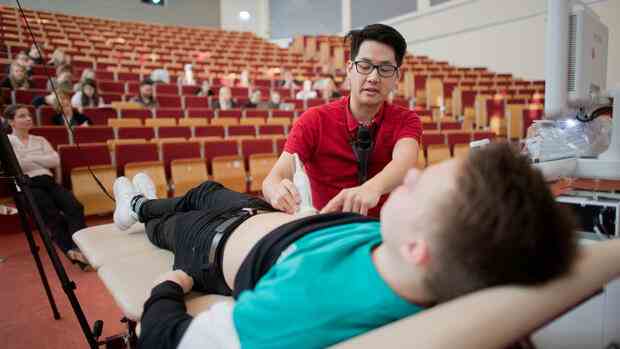A medical degree is the most expensive of all: according to data from the Federal Statistical Office, the federal states incur almost 270,000 euros per student just for the running costs.
(Photo: dpa)
Berlin Because there is a lack of places to study medicine in Germany, around 8,000 Germans are now studying abroad – that is about eight percent of all medical students. This is shown by a new study by the Center for Higher Education Development (CHE). Austria is therefore the main destination country, where the number is now almost 2500. The Czech Republic, Poland, Lithuania, Switzerland and the Netherlands are also popular.
However, the costs of the international courses, which are usually held in English, are sometimes enormous: According to the CHE overview, the price ranges from 2,300 to 27,000 euros per academic year.
Gero Federkeil, CHE specialist for international rankings, sums it up: “With a course duration of six years on average, the costs are up to 150,000 euros just for tuition fees.” He also points out to Federkeil that the cost of living varies from country to country. The CHE has compiled the data for a total of 66 universities.
The students bear these costs because they cannot find a place at a university in their home country, despite the increasing shortage of doctors. Federal Health Minister Karl Lauterbach (SPD) and the Marburger Bund doctors’ association had previously complained that Germany lacked 5,000 study places for young doctors. The minister warned that this would exacerbate the shortage of doctors, which is already noticeable in rural areas.
However, there is no quick remedy in sight. Only a few federal states are expanding medical studies, overall little is happening. Because studying medicine is the most expensive course of all: according to data from the Federal Statistical Office, the federal states incur almost 270,000 euros per student just for the running costs.
States require the federal government to participate in medical training
Bavaria’s Science Minister Markus Blume (CSU) is therefore calling on Lauterbach to share in the costs: “It is important to finance instead of demanding,” he told the Handelsblatt. Bavaria is already training a fifth of all doctors and is currently creating 2,700 new places. Baden-Württemberg has also increased its number, and Brandenburg has decided to set up the first medical faculty in the state.
According to CHE, individual banks have already increased the maximum amount for their student loans due to the increasing demand from medical students abroad. In the eyes of Susanne Johna, chairwoman of the Marburger Bund, the fact that future doctors are forced to study abroad is a problem – and not just because they pay for their studies themselves.
It is also unclear “how many of them will work as graduates in German hospitals or medical practices,” Johna told the Handelsblatt. Some would work in other professional fields or stay abroad. “We can best counteract such a brain drain by creating sufficient study capacities in Germany.”
But even that only helps in the medium term, because it takes at least twelve years for students to become medical specialists. A short-term solution is to reduce bureaucracy so that doctors have more time to treat patients.
>> Read here: Minister of Health Lauterbach is planning higher contributions to long-term care insurance
According to the German Medical Association, there are more doctors in Germany than ever before – in 2021 there were 416,000, 7,000 more than in the previous year. However, they are concentrated in the cities and, above all, more than a fifth will soon be retiring.
“Relying on study places abroad is not a long-term solution”
The President of the German Medical Association, Klaus Reinhardt, therefore calls for action to be taken “quickly and decisively when it comes to promoting young people”. There are almost 12,000 places for first-year students in Germany, and there are many more motivated and capable applicants. “A modern, prosperous, long-lived society like ours should be able to train its own doctors,” said Reinhardt. “Relying on study places abroad is not a long-term solution.”
Lauterbach had complained, for example, that Germany lacked 5,000 study places for young doctors.
(Photo: IMAGO/Chris Emil Janssen)
Most international medical courses in Southeast Europe are offered in English, while there are German-language courses in Hungary and Croatia, for example. Knowledge of the national language is then usually required for clinical training in higher semesters. According to the CHE study, admission to a university place is usually granted via an entrance test that is subject to a fee.
In addition, proof of very good grades in scientific subjects and corresponding knowledge of English often have to be provided for the application. Bafög is also paid for studying abroad. However, the market leader for student loans, the state-owned KfW, does not finance a complete study abroad.
More: “The flood of hip and knee joint operations must come to an end,” says Karl Lauterbach in an interview with the Handelsblatt
